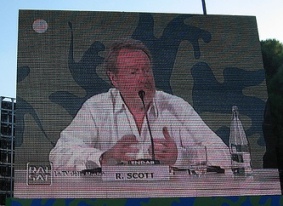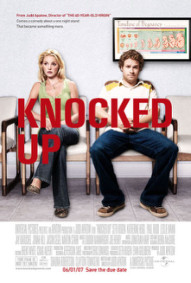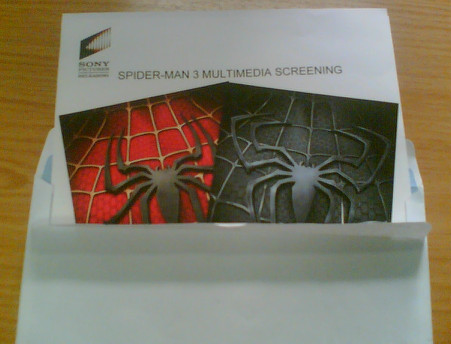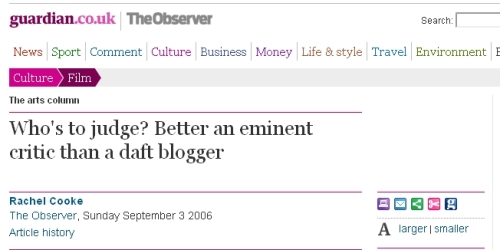One of the interesting things about this year’s Oscar race is the high standard of the films nominated. Compared to last year, the standard is much higher. The three films that dominated last year (Million Dollar Baby, The Aviator & Ray) were good but I don’t think anyone in their right mind would declare them masterpieces (although some American critics did think the Clint Eastwood tearjerker was just that). Sideways was clearly the best film but, as so often with Oscar, suffered from the "best film rarely wins” syndrome. But this year is different. Nearly all the five nominees for Best Picture are worthy of the Oscar.
Let’s take a look at each one before analysing the individual categories:
Brokeback Mountain – Ang Lee’s beautifully made drama has been the awards favourite this year and there are several reasons why. Its highly likely that the taboo breaking gay love story has helped it become an ‘issue film’ – the kind that Oscar loves – and boost its box office. But with all the media chatter of a ‘gay cowboy’ film it’s easy to forget the numerous qualities of this remarkable film: Heath Ledger’s unexpectedly brilliant performance and some strong supporting turns from Michelle Williams and Jake Gyllenhaal; Roderigo Prieto’s wonderful cinematography; Gustavo Santaolalla’s superb minimalist score; the impressive adaptation by Larry McMurty and Diana Ossana from Annie Proulx’s short story and Ang Lee’s masterful direction. The film has also penetrated pop culture to the point where it is difficult to keep up with the spoof posters and trailers circulating on the Internet.
Capote – Although a lot the attention for this film has been devoted to Philip Seymour Hoffman’s stunning central performance as Truman Capote, this depiction of the writing of In Cold Blood is a fascinating study of a writer as a literary vampire as he uses his sources to create a non-fiction masterpiece. From top to bottom, it is hard to find a fault with Bennet Miller’s film: the acting is uniformly excellent, the late 50s and early 60s are evoked remarkably well within a limited budget and the central themes of the film are a rich source for debate and reflection.
Good Night, and Good Luck – At just over 90 minutes long, George Clooney’s second film as a director maybe short but it is perfectly formed. In some ways it represents the awards season with its political edge complemented by an artful construction. David Straithern’s depiction of CBS newsman Ed Murrow is eerily good and Robert Elswit’s cinematography brilliantly evoked the creation of a 50s TV show. The story has a narrow focus that not everyone maybe familiar with but Clooney deserves a lot of credit in using his Hollywood clout (aka promising Warner Brothers Oceans Thirteen) in making a film like this.
Munich – Despite the (often unfair) criticism and controversy that surrounded Spielberg’s revenge drama, it is still a terrific piece of work – an intelligent (if largely fictionalised) examination of Israel’s revenge policy after the Munich Massacre in 1972. A few months back it looked a strong contender for multiple nominations but a succession of mistakes damaged its chances. Spielberg’s decision to not do press for the film and then give an exclusive interview to Time magazine alienated some sections of the media and when the vacuum was filled by a lot of empty but loud rants about the perceived politics of the film it was always going to be labelled as ‘problematic’ despite the largely positive reviews it got in the US (British critics were predictably sniffy about Spielberg taking on such a heavy and loaded subject). It’s nominations for Best Picture and Best Director seem to be a result of Universal’s heavy ad spending in the run up to the nominations rather than any great love for it amongst the Academy’s voters.
Crash – This intelligent but heavy-handed look at racism in LA is the only one of the five Best Picture nominations that I have some reservations about. Although parts of it are undeniably powerful, it has too many rough edges to be considered worthy of Best Picture. There are many things in it I like a great deal: Mark Isham’s atmospheric score; Matt Dillon’s performance as a racist cop; the cinematography by James Muro and Dana Gonzales. But, the way in which the central issue of race is handled is often clumsy and too dry. Characters say things as though writer-director Paul Haggis has copy and pasted them from an anti-racism leaflet. At the same time the patchwork plot is structurally impressive, so I have mixed feelings. It is a good film, but not a great one and I’d certainly place A History of Violence or Walk the Line above it. There is a certainly a feeling amongst some observers that Crash could cause a major upset and win Best Picture but I still don’t see that happening.
Two films that were overlooked for Best Picture (Walk the Line and The Constant Gardener) could also score some important wins (Reese Witherspoon and Rachel Weisz could both win in their respective categories). They are superior to Crash in many ways, but maybe they lacked the x-factor that endears a film to Oscar voters. With that in mind here are my predictions for the major categories, followed by who I think should win.
BEST PICTURE
Winner: Brokeback Mountain
What should win: Brokeback Mountain
It’s the film of the moment, and has broken through a lot of barriers since it won Best Picture at the Venice Film Festival last September. It is the clear favourite to win Best Picture although Crash has probably closed the gap in the final weeks of voting. An upset isn’t completely inconceivable but I can’t see it happening. Ang Lee’s film has dominated the awards season and I don’t see that changing on Sunday night. Let’s not forget Brokeback Mountain is also an outstanding film, marginally better than Munich, Capote and Good Night, and Good Luck.
BEST DIRECTOR
Who will win: Ang Lee for Brokeback Mountain
Who should win: Ang Lee
A foregone conclusion. I simply cannot see anything other than an Ang Lee win. He has already won the DGA award – a reliable indicator of who wins the golden statuette.
BEST ACTOR
Who will win: Philip Seymour Hoffman for Capote
Who should win: Philip Seymour Hoffman
Early on in the race I thought Heath Ledger would emerge as favourite but I think Philip Seymour Hoffman has this one in the bag. His performance is outstanding and arguably the most ‘showy’ of all the 5 nominated which probably means it stuck in the minds of voters more than the others.
BEST ACTRESS
Who will win: Reese Witherspoon for Walk the Line
Who should win: Reese Witherspoon
The main rival here for Witherspoon is Felicity Huffman for her excellent portrayal of a pre-op transsexual in Transamerica. But Witherspoon is the strong favourite – she won at the Golden Globes and the SAGs and gives a dazzling performance in the Johnny Cash biopic as June Carter Cash. Judi Dench (Mrs. Henderson Presents), Keira Knightley (Pride & Prejudice) and Charlize Theron (North Country) are not in the race.
BEST SUPPORTING ACTOR
Who will win: George Clooney for Syriana (just)
Who should win: George Clooney
The hardest category to predict. Paul Giamatti (Cinderella Man) is neck and neck with George. Giamatti was stupidly overlooked last year for his brilliant performance in Sideways and maybe he’s getting the sympathy vote here. That said Cinderella Man suffered by being released in the summer and bombing at the box office and I have a feeling Clooney is going to get rewarded for his Oscar worthy work in both Syriana and Good Night, and Good Luck. There is a theory that Matt Dillon (Crash) could benefit from a split vote. Even Jake Gyllenhaal (Brokeback Mountain) could figure after his BAFTA win but I still think Clooney has to be the favourite. But only just.
BEST SUPPORTING ACTRESS
Who will win: Rachel Weisz for The Constant Gardener (just)
Who should win: Rachel Weisz
I felt for a long time that this was a two horse race between Rachel Weisz (The Constant Gardener) and Michelle Williams (Brokeback Mountain). My gut feeling is for Rachel Weisz. But there are two others who could win. I have a nagging feeling Catherine Keener could sneak a win for her small but perfect turn in Capote, whilst Amy Adams (Junebug) could be a good outside bet. Frances McDormand looks out of it, although she was fine in North Country. I’m still not 100% on this but my gut feeling is for Weisz. She didn’t win at the BAFTAs but for some reason was nominated in the Best Actress category there. But in the Best Supporting category I think Weisz should win.
BEST ORIGINAL SCREENPLAY
What will win: Crash by Paul Haggis and Bobby Moresco
What should win: Good Night, and Good Luck by George Clooney and Grant Heslov
A tough call, but Crash has to be the favourite here. It might not get Best Picture but it ticks all the boxes for a screenplay award: it addresses a contemporary issue on LA’s doorstep; there are a lot of juicy moral lessons in it and there are moments of great power. However, if there is an upset Good Night, and Good Luck, shouldn’t be completely ruled out.
BEST ADAPTED SCREENPLAY
What will win: Brokeback Mountain by Diana Ossana and Larry McMurty
What should win: The Constant Gardener by Jeffrey Caine
Another tough one to call. I’m split between Brokeback Mountain and The Constant Gardener. Both are terrific screenplays but I think Diana Ossana and Larry McMurty will win, especially if Brokeback Mountain starts cleaning up although Jeffrey Caine’s adaptation of The Constant Gardener is perhaps the (slightly) greater achievement.
OTHER PREDICTIONS
Best Animated Feature
Wallace & Gromit in The Curse of the Were-Rabbit
Best Documentary
March of the Penguins
Best Cinematography
Memoirs of a Geisha (although Brokeback Mountain and Good Night, and Good Luck would be more worthy winners)
Best Score
Brokeback Mountain
Best Song
"Travelin Thru" from Transamerica.
Best Editing
Crash
Sound Editing
King Kong
Visual Effects
King Kong
Sound Mixing
Walk the Line
What do you think? Your comments are always welcome.
> The Offical Oscars site
> Wikipedia with all the nominations
> IMDb Special Section for this year’s Oscars
> Oddschecker with all the latest Oscar odds
> The Stinkers and The Razzies – ‘Alternative’ Oscars celebrating the worst films of 2005
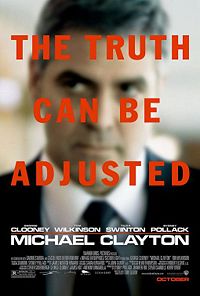 Michael Clayton opened in the UK almost 2 weeks ago and in limited release in the US last Friday.
Michael Clayton opened in the UK almost 2 weeks ago and in limited release in the US last Friday.